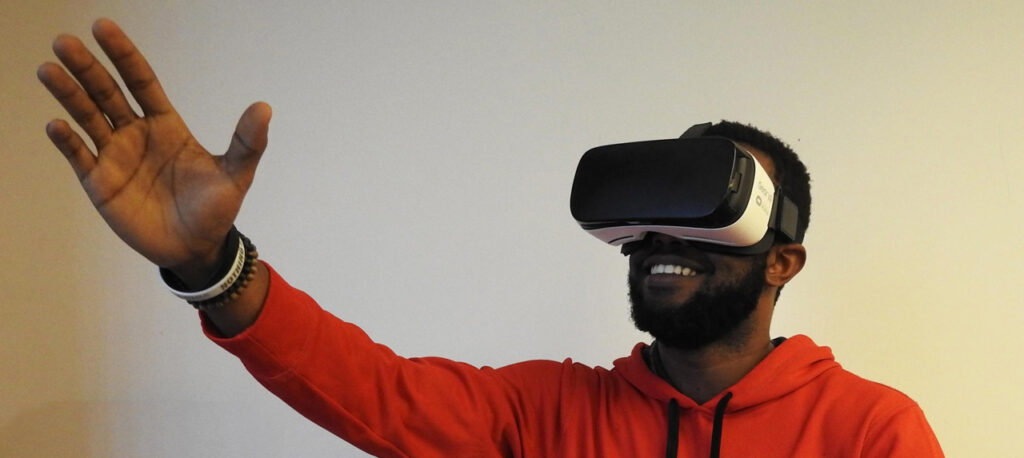
VR and the Return of Hardware
Ended soon
Here at bluesalve we’ve been closely watching the evolution of virtual reality for the consumer market. When you’re looking at a genuinely revolutionary technology, you can’t help but get excited about the business possibilities. We believe VR will create the next major product category in consumer electronics. Is your company ready?
Where Are We Now?
At this still-early stage, VR is already a booming business. According to IDC, global shipments for headsets jumped a whopping 241.6% during Q1 2022 compared to Q1 last year. While supply chain issues did depress the 2021 numbers, analysts are generally unanimous on the trajectory. Grandview says VR is a $21 billion industry already, and expects 15% CAGR through the end of the decade.
Two trends should be heartening for CE manufacturers. The first is that early adopters are enthusiastically on board. Capturing the hearts of these influencers has always been a critical step toward market acceptance. Another cause for optimism is that adjacent technologies are also gaining real momentum. Apple, Sony, Dolby and others are already deep into 3D spatial audio, and Meta isn’t far behind.
Playback Matters
The revolution in digital entertainment over the past 20 years can be summed up one word: software. Think of how many hardware products have taken the hit since the streaming revolution. Disc players of every stripe, A/V receivers, passive speakers, even TV monitors, now that people watch video on their phones. Sure, you need a streamer (maybe). But that shiny new Roku is only $39, and a 4k FireStick costs even less. Is there a future in making and selling VR hardware?
The data says yes. According to Grandview, VR’s hardware segment accounted for the largest revenue share of over 65.0% in 2021, and is anticipated to dominate the market through the end of the decade. Who’s in it to win it on the hardware front? So far it’s Meta/Facebook – which has been aggressively subsidizing hardware in order to build the base for VR content. You can get a Meta headset these days for $299. By contrast, Apple’s AR glasses due in early 2023 may sell for as little as $1000 or as much as $2000. Apple is accustomed to making money on hardware. It will be interesting to see how well that model holds up for VR.
What Are the Pitfalls?
In the earliest days of AR/VR, industry insiders worried about a format war. No one wants to write their game or application for multiple platforms. Even developers that author for xBox and Playstation are able to share some code. We can think of numerous examples of proprietary software/hardware combos that didn’t live to tell the tale. Anyone remember SACD or China Blue?
Some 30 companies have already signed on to Meta’s proposed Metaverse Standards Forum. Notably, Apple is not part of the consortium. Even though numerous companies and bodies are pushing for broad interoperability, there are major business and technical challenges. VR and AR both span video, audio, web connectivity and other domains. All would require interoperability standards. Now add standards issues across everything from avatars to privacy to financial transactions. VHS vs. Beta was a cakewalk next to this.
Out of Chaos, Opportunity
Everyone knows that content is king and that won’t change here. Consumers will buy into VR for the software, not the headsets. But much of the VR value proposition comes from its ability to fully immerse the user into the virtual field. Images have to be clear to be convincing. Motion has to be fluid. Audio has to seamlessly track movements and actions. The quality of the virtual experience will depend on the hardware, not the software.
Hardware here means everything from optical lenses to speakers to motion trackers, materials and more. Unlike conventional gaming, where the video monitor and (perhaps) audio system determine the quality of the experience, a VR headset is the video monitor and audio system. Once VR hits critical mass, it will be easy for end users to see and hear the difference between better and lesser hardware.
Component and finished goods makers with a focus on “better” have serious new opportunities in the VR market.
# # #
Colin Burke McClure is a Senior Consultant for bluesalve partners. Colin is a 25-year veteran of the technology industry, holding senior leadership roles with Monster Cable, Niveus Media, Atlona, and MiOS.

